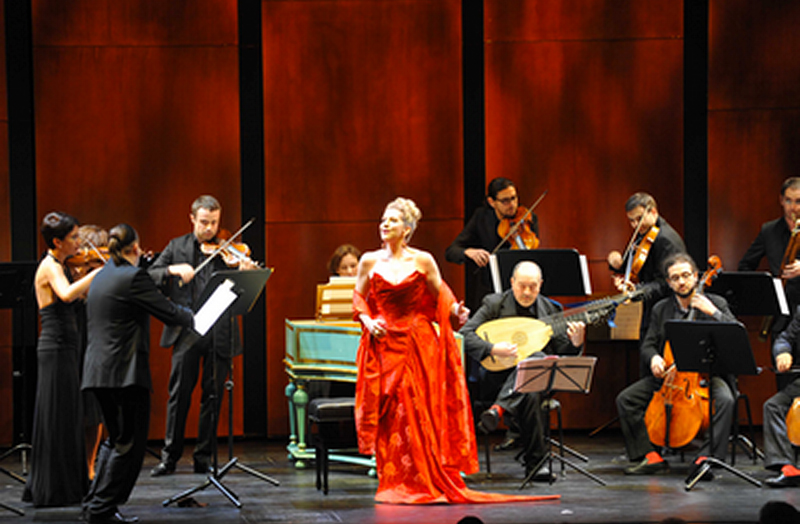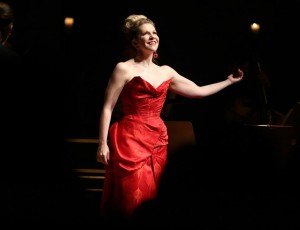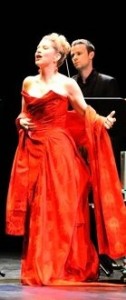Drama Queens
“THE QUEEN OF BAROQUE
DRAMA QUEENS is an ace of an evening for any venue! Indeed, the experience enters my own personal treasure chest of extraordinary performances in past decades, with names such as Schwarzkopf, Fischer-Dieskau, Vickers, Nilsson and Callas topping the list.
Success truly lies in the mix of all those artistic qualities required to serve the music and compel an audience to hang on every note and word in a programme. Joyce DiDonato’s charmingly unaffected – and therefore affecting – stage manner won the hearts of this Theater an der Wien audience.
DiDonato’s use of consonants and the venom expressed through clenched teeth remind at times of Callas. The flawless scale work (in full parade in Handel’s “Brilla nell’alma” from Alessandro), artistic imagination, and a dauntless approach – whether in dramatic attack or finely-spun pianissimi – all ring true (rather than designed for effect), and make for a rare musical experience. Whether in a state of lament or calling for blood, these characters are truly credible.
The reception resembled a World Cup soccer event with foot stamping spreading like wildfire after the second item on the programme, and a standing ovation for the encores.
Not to be missed at any cost!” ~ Moore Parker The Opera Critic November 2012 [Vienna]
~~~~~
“JOYCE DIDONATO IS AN INTERNATIONAL PHENOMENON” ~ Michael Migliore Musical Criticism February 2013 (London)
~~~~~~
“Ms. DiDonato’s voice is a rare, unique kind of powerhouse that has the ability to drop to the depths then rise flawlessly, and seemingly effortlessly. This fact was made evident from the very first aria to the last. But I have one question about Ms. DiDonato; is she a singing actress, or an acting songstress? It is impossible to make the distinction because of her incredible artistry. Just by watching her, one can tell that she lives in this world of trills, legato, and fireworks.” ~ Jake Johansen Examiner November 2012 [New York]
~~~~~~
“Singers aren’t ranked like tennis players, but if they were, you’d be hard-pressed to keep Joyce DiDonato out of the No. 1 spot. When she took the stage, the audience roared for her, as though expecting something good. They got it. She put on a clinic of singing, the way Marilyn Horne used to do, in her prime. Technically, DiDonato can do practically anything. She is almost always in the center of the note. She is utterly secure, meaning that you can be secure as you sit in your seat. Her high notes are free. Her low notes are juicy. She can dig into her lower register, the way a violinist does his strings.
Of her musicality, there seems no end. She added a speck of American jazz to a couple of those baroque arias, I swear. Her Italian diction is a model—as when she spat out the first words of a Monteverdi aria, “Disprezzata regina” (“Despised queen”).
Usually, when the band introduced an aria, she looked eager to sing, champing at the bit to sing. We would be too, if we could sing like that.” ~ Jay Nordlinger City Arts December 2012
~~~~~
“A masterpiece of control, agility and alluring sound throughout her range, with its dusky lows and bright high notes.” ~ Vivienne Schweitzer NY TIMES November 2012
~~~~~~
“A program that could hardly be more dramatic.” ~ Salzburger Nachrichten November 2012 [Vienna]
~~~~~
“DiDonato played masterfully with her voice, not only in dynamic nuances between pianissimo and fortissimo, but also with the colors that ranged from dramatic intensity to breathy desperation.” ~ Nike Luber Pforzheimer Zeitung November 2012 [Baden Baden]
~~~~~
“DiDonato revisits a passion for baroque with this project, which compiles the arias of abandoned, forlorn and vengeful queens. The result plunges the listener into the tortured emotional world of a female archetype […]
One of DiDonato’s most powerful moments emerged in “Piangerò la sorte mia” from Handel’s Giulio Cesare. DiDonato’s powers of expression easily rise to the ranks of singers such as Beverly Sills and Cecilia Bartoli who have championed this role. The nearly choked timbre of her perfectly restrained pianissimo in the da capo section reached the tear jerking point with a break in accompaniment on the final line “finché vita…in petto avrò”
DiDonato closed the concert with “Brilla nell’alma” from Handel’s Alessandro, an especially compelling number […] As on recording, DiDonato soared through rapid coloratura runs that capture Rossane’s glee.” ~ Rebecca Schmid Musical America November 2012 [Berlin]
~~~~~
“Una diva del siglo XXI: además de cantar tienen el carisma de las estrellas de cine.” ~ José Catalán Deus Periodista March 2013
“JOYCE , REINE DU GLAMOUR
Joyce DiDonato has sovereignly won over the audience alternating arias of rage – always dignified – and melancholy, in a crescendo of virtuosity. Her radiant timbre stuns in the highest notes, powerful, expressive and flexible. A sumptuous evening.” ~ Catherine Jordy Forum Opera November 2012 [Baden Baden]
~~~~~
“Joyce DiDonato’s great musicality, her wonderful and perfectly trained voice, and her will to communicate the music she loves to her audience all combined to make Friday night’s second half especially rewarding.
It’s hard to put the effect into words, but something about hearing the aria “Morte col fiero aspetto” – “Death’s grisly aspect / holds no horror for me” – from Johann Adolf Hasse’s 1725 “Anthony and Cleopatra” showed how beautifully trained DiDonato’s voice really is, and the depth of experience upon which she can draw in performance.” ~ John Heuertz KC Star November 2012


